Deep Meaning Bible Verse Hebrew Tattoo Designs: Inspiration
In selecting a deep-meaning Bible verse for a Hebrew tattoo design, it is essential to balance theological significance, personal resonance, and contextual integrity. Timeless verses such as Psalm 23:4, which offers divine comfort and guidance, or Jeremiah 29:11, highlighting hope and divine providence, serve as profound reminders of faith.
Accurate translation from the original Hebrew is vital to maintain theological precision and avoid misinterpretation. Verses like Proverbs 3:5 and Isaiah 40:31 emphasize reliance on divine wisdom and strength, enriching the spiritual depth of the tattoo.
Continuing forward, one will find a detailed exploration of these verses and their applications.
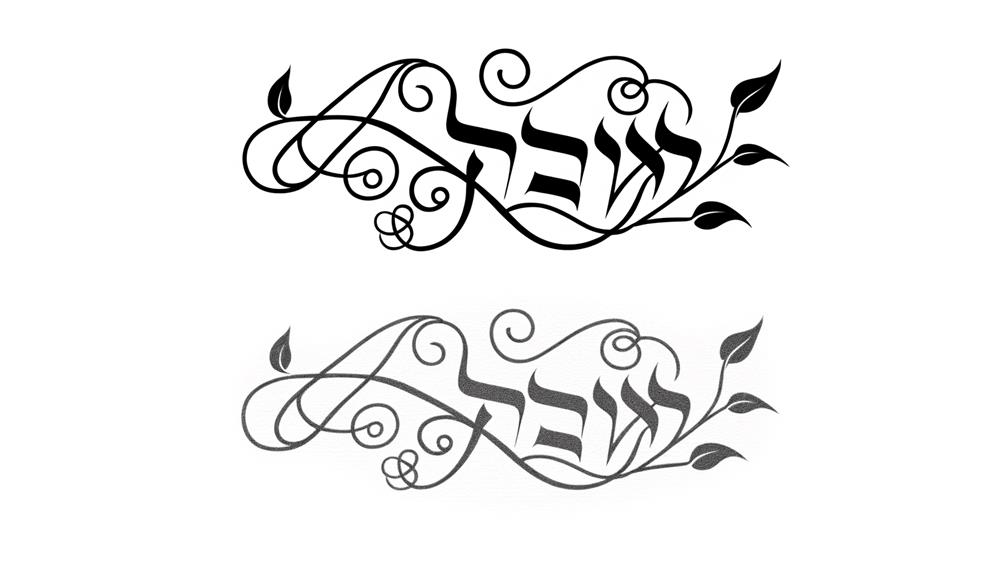
Deep Meaning Bible Verse Hebrew Tattoo Designs: Inspiration and Ideas
| Bible Verse | Hebrew Translation | Meaning |
|---|---|---|
| Proverbs 3:5-6 | בטח אל יהוה בכל לבך | Trust in the Lord with all your heart |
| Psalm 23:1 | יהוה רעי לא אחסר | The Lord is my shepherd, I shall not want |
| Isaiah 40:31 | וקוי יהוה יחליפו כח | Those who hope in the Lord will renew their strength |
| Jeremiah 29:11 | כי אנכי ידעתי את המחשבת | For I know the plans I have for you |
| Song of Solomon 6:3 | אני לדודי ודודי לי | I am my beloved’s, and my beloved is mine |
Choosing the Right Verse
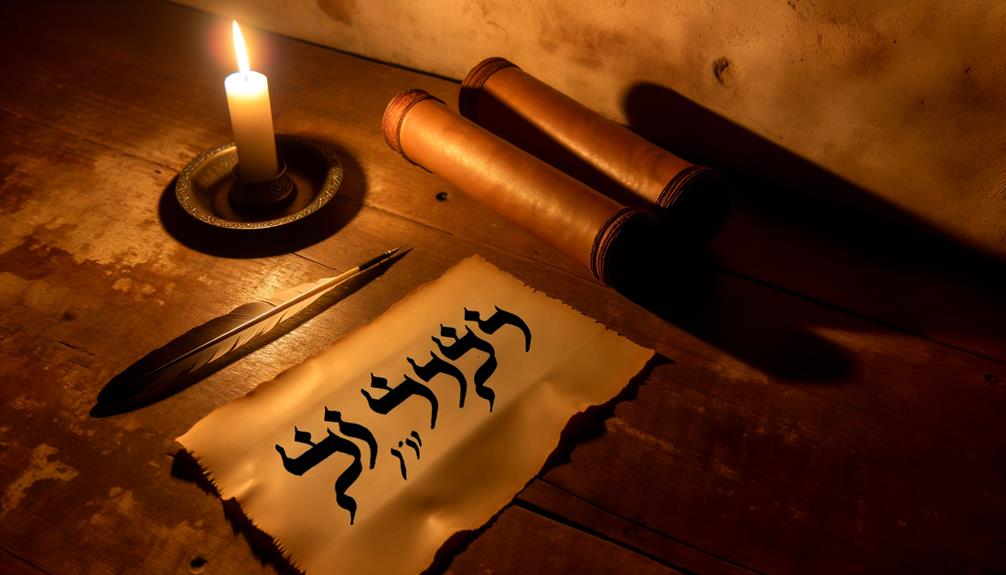
Selecting the appropriate Bible verse for a tattoo requires a thoughtful consideration of theological significance, personal resonance, and contextual integrity.
The chosen scripture should reflect a profound aspect of one’s faith journey, embodying enduring truths rather than transient emotions. Theological significance guarantees that the verse aligns with core Christian doctrines, avoiding misinterpretations or misrepresentations.
Personal resonance involves selecting a passage that deeply connects with one’s life experiences, spiritual struggles, or aspirations. Contextual integrity is paramount; understanding the verse within its scriptural and historical setting prevents distortions of its meaning.
Psalm 23:4 – Comfort in Faith
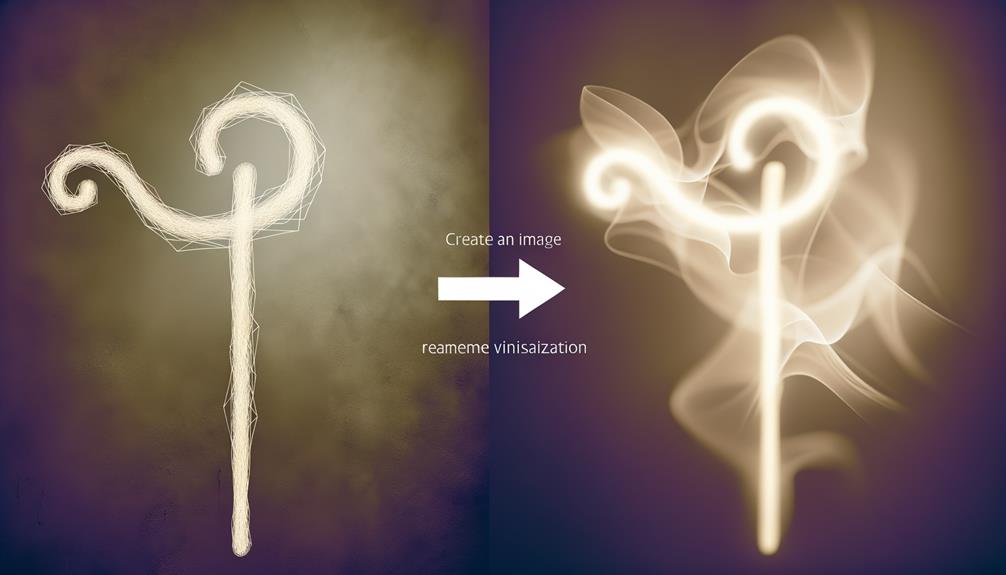
Psalm 23:4, a verse celebrated for its profound reassurance, offers a compelling source of comfort through its depiction of divine guidance and protection amidst life’s adversities.
The verse, written in Hebrew as ‘גַּם כִּי־אֵלֵךְ בְּגֵיא צַלְמָוֶת לֹאָ֮א רָע כִּי־אַתָלה עִמָּדִי,’ translates to ‘Even though I walk through the valley of the shadow of death, I will fear no evil, for you are with me.’
This powerful declaration underscores the unwavering presence of God as a shepherd who guides and protects.
Rich in theological significance, it encapsulates the essence of faith as a refuge in peril, offering solace and a sense of divine companionship to those who choose this verse for their tattoo design.
Jeremiah 29:11 – Future and Hope

Jeremiah 29:11, a verse imbued with the promise of divine providence, articulates a vision of hope and a prosperous future, resonating deeply with those seeking assurance and optimism through their faith. This verse, originating from a letter to exiled Israelites, underscores God’s enduring commitment to their well-being and future. The Hebrew phrase ‘מחשבות שלום ולא לרעה’ encapsulates this divine intention of peace and not harm.
| Element | Hebrew | Translation |
|---|---|---|
| Divine Plan | מחשבות | Thoughts/Plans |
| Peace | שלום | Peace |
| Future | אחרית | Future |
| Hope | תקוה | Hope |
| Harm | רעה | Harm |
Jeremiah 29:11 consequently acts as a powerful emblem of faith and divine assurance, making it a profound choice for tattoo designs.
Proverbs 3:5 – Trust in God
Why does Proverbs 3:5, with its profound exhortation to ‘trust in the Lord with all your heart and lean not on your own understanding,’ serve as an enduring demonstration to the importance of unwavering faith in divine wisdom?
This verse encapsulates a fundamental theological principle: the supremacy of divine guidance over human reasoning.
The Hebrew text, ‘בְּכָל־לִבֶּךָ בְּטַח אֶל־יְהוָה,’ emphasizes a holistic, heartfelt trust in God.
It challenges believers to relinquish self-reliance, recognizing the limitations of human intellect.
This passage, often chosen for tattoos, symbolizes a perpetual commitment to spiritual reliance, encapsulating a daily reminder of faith’s necessity.
In this way, it holds a timeless relevance, encouraging adherents to seek divine insight in all life’s complexities.
Isaiah 40:31 – Strength and Renewal

Isaiah 40:31 serves as a profound declaration to the themes of strength and renewal, encapsulated through the potent symbolism of the eagle.
This imagery not only conveys a sense of divine empowerment but also underscores the virtues of faith and inner resilience.
Symbolism of Eagle Imagery
Drawing from Isaiah 40:31, the imagery of the eagle serves as a potent symbol of strength and renewal, deeply embedded in theological and cultural contexts.
In biblical hermeneutics, the eagle, or נשר (nesher) in Hebrew, signifies divine empowerment and the transcendence of earthly struggles. This avian metaphor encapsulates the transformative process of shedding old feathers for new, paralleling spiritual rejuvenation.
The eagle’s ability to soar above storms is illustrative of overcoming adversity through divine intervention. Theologically, this imagery reassures the faithful of God’s sustaining power, offering a visual representation of hope and endurance.
Within the broader cultural milieu, the eagle remains an emblem of fortitude, making it a profound choice for those seeking meaningful tattoo designs.
Faith and Inner Strength
Embodying the profound themes of faith and inner strength, Isaiah 40:31 serves as a cornerstone for understanding spiritual resilience and divine renewal.
The verse, rendered in Hebrew as יִקְווּ אֲדֹנָי יַטִיפוּ כֹּחַ, speaks of those who wait upon the Lord gaining new strength, likened to soaring on eagle’s wings.
This imagery not only emphasizes an elevated state of being but also conveys an intimate connection to divine sustenance.
In theological context, it underscores the notion that true strength is derived from unwavering faith and reliance on God.
For individuals seeking a tattoo that encapsulates these profound themes, Isaiah 40:31 offers a timeless reminder of enduring hope and spiritual fortitude.
Philippians 4:13 – Endurance and Power
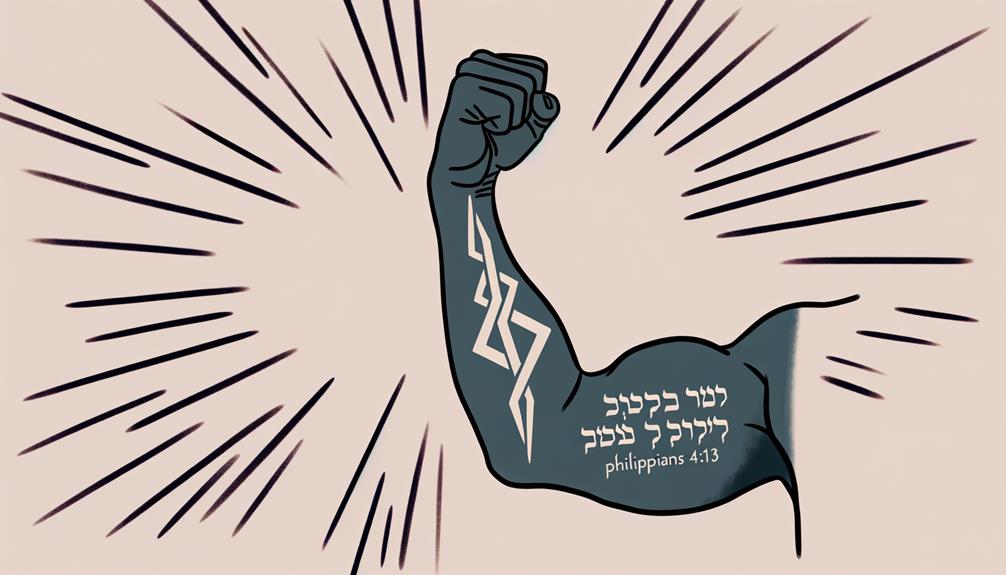
Philippians 4:13, often rendered in Hebrew script for its profound theological weight, serves as a potent emblem of spiritual empowerment and endurance.
This verse, ‘I can do all things through Christ who strengthens me,’ invites a rich contextual analysis of its original linguistic nuances and theological implications.
To maximize its visual and spiritual impact, thoughtful consideration of design and placement is paramount, ensuring the tattoo not only reflects personal faith but also resonates with enduring power and resilience.
Hebrew Script Significance
The Hebrew script of Philippians 4:13, which conveys themes of endurance and power, offers a profound and nuanced exploration of faith’s strength in overcoming life’s challenges. This verse, often translated as ‘I can do all things through Christ who strengthens me,’ encapsulates significant theological and linguistic elements:
- Endurance (סבלנות): The Hebrew term emphasizes patience and persistence, key aspects of enduring faith.
- Power (כוח): Rooted in divine strength, it reflects the believer’s reliance on a higher power.
- Faith (אמונה): The script underscores unwavering belief as the foundation of spiritual resilience.
- Contextual Integrity: Understanding the original Hebrew provides deeper insight into the cultural and spiritual context of the verse.
These elements collectively deepen the verse’s impact, making it a profound choice for tattoo designs.
Spiritual Empowerment Symbolism
Building on the profound insights derived from the Hebrew script, the themes of endurance and power in Philippians 4:13 serve as a dynamic representation of spiritual empowerment.
The verse, ‘I can do all things through Christ who strengthens me,’ encapsulates a theological affirmation of divine aid and personal resilience.
Linguistically, the Hebrew translation accentuates the intimate bond between human frailty and divine omnipotence.
Contextually, Philippians 4:13 emerges from Paul’s epistle, underscoring a message of unwavering faith amid adversity.
This potent combination of scriptural heritage and linguistic depth provides a rich tapestry for those seeking to embody spiritual fortitude in their lives.
Consequently, the verse becomes a profound reflection of enduring strength and divine empowerment.
Design and Placement
When contemplating the design and placement of a tattoo featuring Philippians 4:13, it is essential to reflect on both the theological significance and the desired visual impact. This verse, which reads, ‘I can do all things through Christ who strengthens me,’ underscores themes of endurance and divine empowerment.
To guarantee both theological depth and aesthetic appeal, consider the following:
- Font Style: Opt for a Hebrew script that captures the ancient, sacred essence of the text.
- Placement: Select a location that aligns with the verse’s message, such as the forearm or wrist, symbolizing strength and action.
- Accompanying Symbols: Integrate symbols like the cross or olive branches to enrich the spiritual narrative.
- Size and Visibility: Decide based on personal and professional considerations, balancing visibility with discretion.
Song of Solomon 6:3 – Love and Belonging
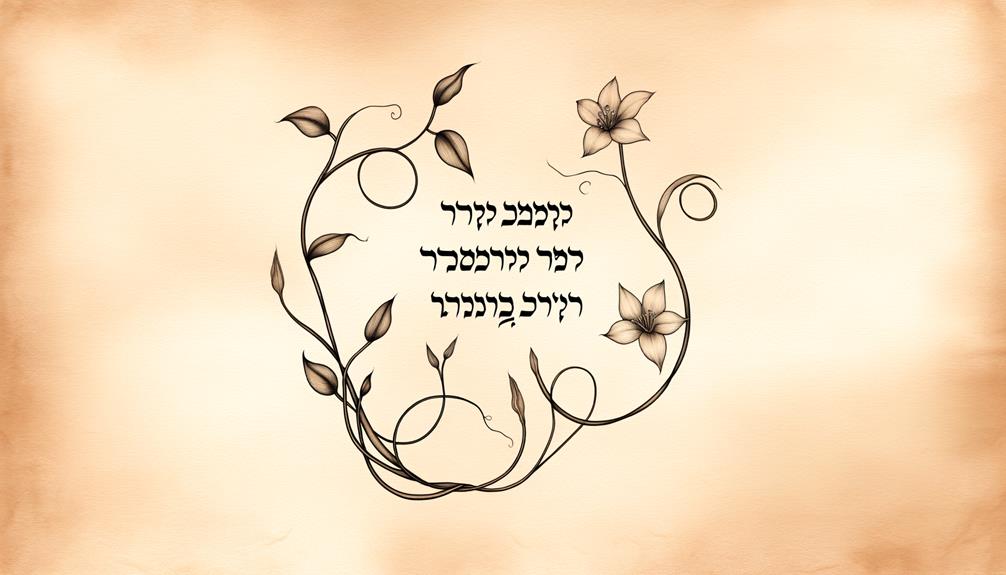
Song of Solomon 6:3 encapsulates the profound themes of love and mutual belonging, eloquently stating, ‘I am my beloved’s and my beloved is mine.’
This verse, rendered in its original Hebrew, carries deep theological significance, emphasizing the reciprocal nature of love and commitment. Within the context of the Song of Solomon, it speaks to the intimate and unbreakable bond between two individuals.
The phrase, laden with covenantal language, mirrors divine love and fidelity, making it a popular choice for those seeking a tattoo that symbolizes enduring relationships.
The Hebrew script’s aesthetic appeal further enhances its poignancy, providing a visual reminder of love’s enduring promise.
This verse serves as a reflection of the beauty of mutual devotion and belonging.
Deuteronomy 31:6 – Courage and Strength
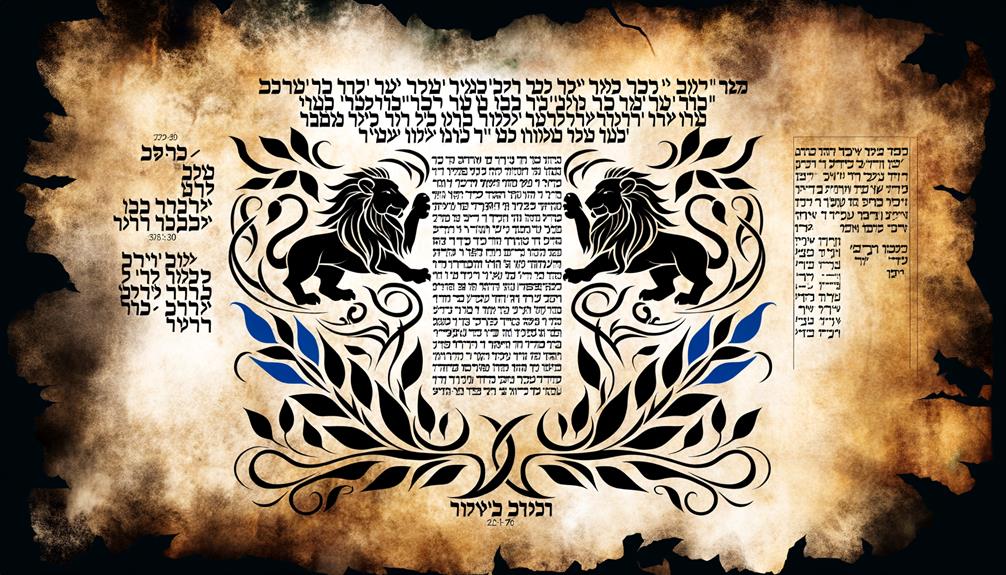
Deuteronomy 31:6 stands as a powerful witness to courage and strength, declaring, ‘Be strong and courageous.’ This verse, situated within Moses’ farewell address, exhorts the Israelites as they prepare to enter the Promised Land. A Hebrew tattoo of this verse encapsulates profound theological significance:
- Historical Context: Moses’ leadership shift to Joshua underscores the need for divine assurance.
- Linguistic Precision: The Hebrew words חִזקוּ וְאִמצוּ (ḥizqū ve’imṣū) translate to ‘be strong and courageous,’ emphasizing internal fortitude.
- Divine Promise: The latter part of the verse reassures that God will not abandon His people.
- Symbolic Representation: Tattoos of this verse serve as a personal reminder of resilience and faith in the face of life’s challenges.
This passage, as a result, is a confirmation of enduring strength grounded in faith.
Joshua 1:9 – Bravery and Assurance
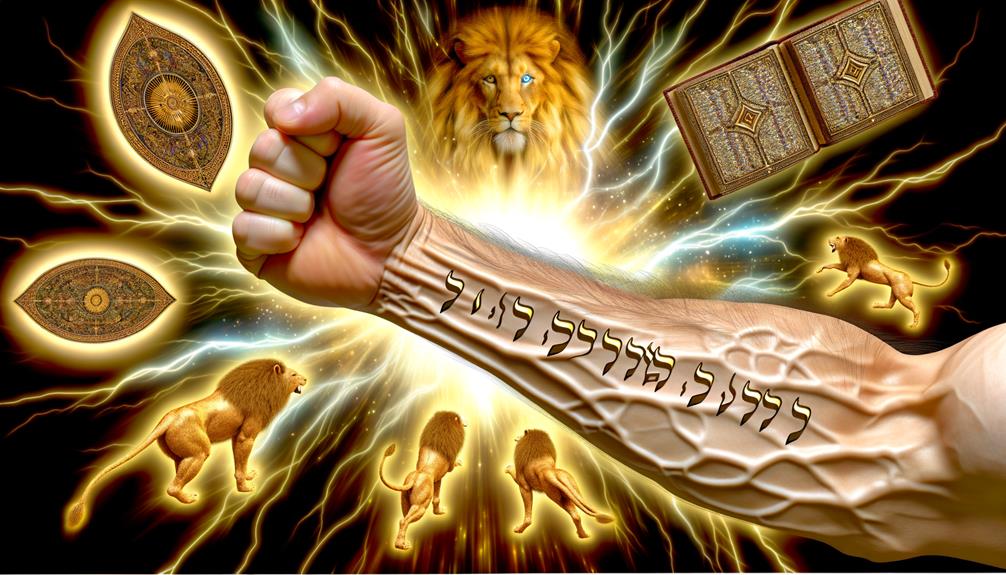
Joshua 1:9, a verse encapsulating bravery and divine assurance, holds significant weight in both its original Hebrew script and its broader theological context.
This verse’s encouragement and strength symbolism make it a profound choice for tattoo designs, offering both personal and communal resonance.
Strategically considering placement can further amplify its meaning, ensuring the verse resonates deeply with the individual and those who witness it.
Hebrew Script Significance
In the original Hebrew, the script of Joshua 1:9 imparts profound layers of meaning that underscore themes of bravery and divine assurance. This verse, etched in Hebrew, carries a depth that transcends translation, capturing the essence of God’s command and promise. The significance is multifaceted:
- Linguistic Root Analysis: The Hebrew words ‘חֲזַק’ (chazak) and ‘אֲמָץ’ (amatz) translate to ‘be strong’ and ‘be courageous,’ respectively, emphasizing inner fortitude.
- Covenantal Context: The verse reiterates God’s covenant with Joshua, ensuring divine presence and support.
- Cultural Resonance: The script holds historical and cultural weight, reflecting ancient Israelite values.
- Spiritual Assurance: The Hebrew text affirms God’s unwavering commitment, offering profound spiritual reassurance.
This exploration underscores the verse’s enduring relevance.
Encouragement and Strength Symbolism
The verse Joshua 1:9 stands as a profound witness to the themes of encouragement and strength, encapsulating divine promises of bravery and assurance. This scripture, rendered in the original Hebrew, epitomizes the invigoration and steadfastness granted through faith. The verse admonishes: “Have I not commanded you? Be strong and courageous. Do not be afraid; do not be discouraged, for the Lord your God will be with you wherever you go.”
| Hebrew Text | Transliteration | English Translation |
|---|---|---|
| חֲזַ֖ק וֶאֱמָ֑ץ | Chazak ve’ematz | Be strong and courageous |
| אַל־תִּעֲרֹ֖ץ | Al-ti’arotz | Do not be afraid |
| וְאַל־תֵּחָ֑ת | Ve’al-techat | Do not be discouraged |
| יְהוָ֣ה אֱלֹהֶ֔יךָ | Adonai Eloheicha | The Lord your God will be with you wherever you go |
This passage offers profound reassurance, encouraging believers to embrace fortitude through divine companionship.
Placement Ideas and Meaning
Selecting the ideal placement for a Joshua 1:9 tattoo necessitates careful consideration of both the verse’s theological significance and the personal resonance it holds for the individual. This verse, which speaks of bravery and divine assurance, can be meaningfully placed to reflect its profound message.
Here are four thoughtful placement ideas:
- Inner Forearm: A visible yet introspective location, ideal for daily inspiration and personal reflection.
- Upper Back: Symbolically representing the burden one carries with divine support, reminding the wearer of God’s omnipresence.
- Chest, near the heart: Emphasizes the verse’s emotional depth and its foundational role in one’s spiritual life.
- Wrist: A discreet yet powerful reminder, easily visible to the wearer, promoting continuous courage and faith.
Ensuring Accurate Translation
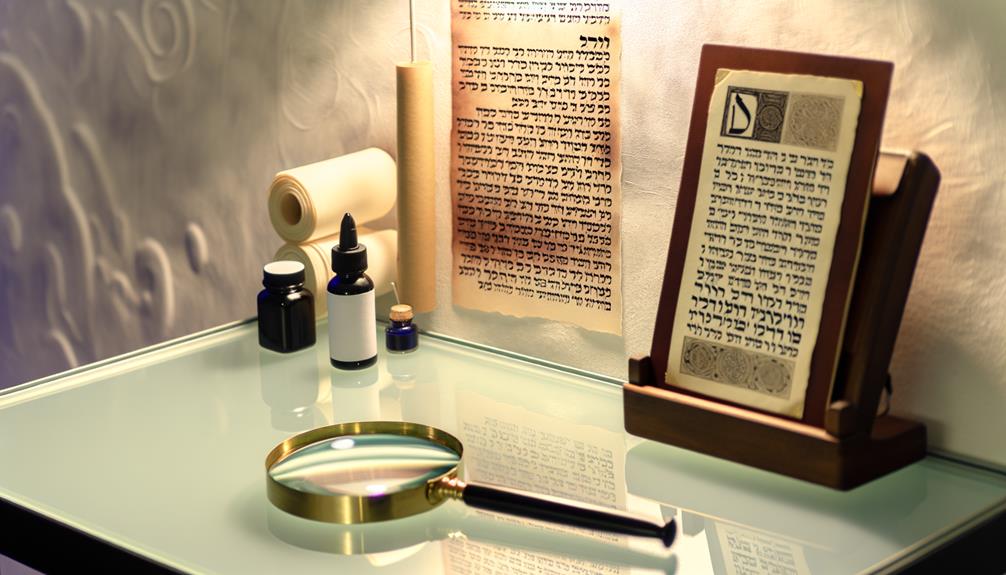
Accurate translation of Bible verses for tattoo designs necessitates a thorough understanding of the original biblical languages—Hebrew, Aramaic, and Greek—to preserve theological integrity and contextual meaning. Misinterpretation can lead to significant deviations from the intended message. Theologically informed translation guarantees that the profound essence of scripture is retained. Here is a comparison between common mistranslations and their correct versions:
| Common Mistranslation | Correct Translation |
|---|---|
| ‘Love one another’ | ‘Ahav yeracham’ (אהב ירחם) |
| ‘God is my strength’ | ‘Elohim hu maozzi’ (אלהים הוא מעוזי) |
| ‘Faith, hope, love’ | ‘Emunah, tikvah, ahavah’ (אמונה, תקווה, אהבה) |
| ‘The Lord is my shepherd’ | ‘Adonai ro’i’ (יהוה רועי) |
| ‘Be still and know’ | ‘Harpu u-de’u’ (הרפו ודעו) |
Guaranteeing precision in translation not only honors the sacred texts but also deepens the spiritual significance of the tattoo.
Conclusion
Selecting a Bible verse for a Hebrew tattoo transcends mere aesthetic choice; it embodies profound theological significance and personal resonance. The decision involves a deep exploration of one’s faith and the messages that resonate on a spiritual level. Hebrew interpretations of Bible verses can enrich this experience, offering insights into the original language and context that may not be captured in translations. Ultimately, a tattoo featuring a carefully chosen Hebrew verse can serve as a lifelong reminder of one’s beliefs and the values that shape their identity.
Each verse, whether it be Psalm 23:4’s assurance of divine comfort or Joshua 1:9’s call to courage, offers a unique spiritual message.
Yet, one must tread carefully, ensuring translations capture the verse’s original essence.
Indeed, the chosen scripture may not only adorn the body but also serve as a lifelong declaration of one’s faith and values.






